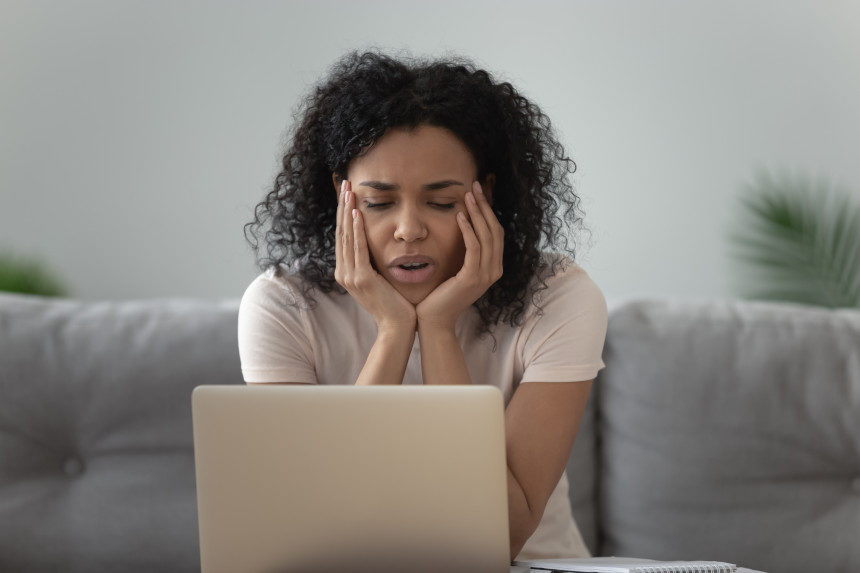In David Foster Wallace’s notoriously dense novel Infinite Jest, published in 1996, the late author took a sardonic stab at predicting the future of video calling. He described home videophone units complete with hooks for hanging resin masks users would wear to give the illusion they were more attractive (and more attentive).
Now that we’ve been in the accidental golden age of video calling for a year, we can ask: Did he get it right?
Not exactly.
Of course, we don’t need scientific research to tell us that meeting in person is a more enriching cure for isolation, if not more productive and healthy overall.
But the era of remote work and school has illuminated our dreads and vanities in other ways. Immediately after stay-at-home orders went into effect, we were awash in tips and tricks to present our best selves on any one of the now-ubiquitous video conferencing apps: Set up flattering side-lighting. Don’t wear plaid. Display your impressive bookshelf in the background (maybe even that copy of Infinite Jest you almost finished). Zoom — or Jitsi or Skype or House Party — calls became channels for holiday gatherings, happy hours (or, as I call them, sad hours), and even funerals.
Some employers are going to be tempted to weave video calling into work for good, but the best choice we could make is to turn it into an anachronism. Who wants to carry over this daily, alienating practice into the post-COVID workplace?
Widely described “Zoom fatigue” has left millions of video callers exhausted after days of back-to-back digital meetings. Psychological research has yet to catch up with the current scope of video calling, but experts say that it likely requires more focus while distorting the natural perceptions we use in communication.
Of course, we don’t need scientific research to tell us that meeting in person is a more enriching cure for isolation, if not more productive and healthy overall.
One particularly insidious aspect of video calling is seeing yourself reflected through your own camera. David Foster Wallace likened this discomfort to the anxiety of watching Richard Nixon in the televised 1960 debates, on a massive, personal scale. The good news is that there is a function to disable the view of your own feed. You’re welcome.
This article is featured in the March/April 2021 issue of The Saturday Evening Post. Subscribe to the magazine for more art, inspiring stories, fiction, humor, and features from our archives.
Featured image: Shutterstock
Become a Saturday Evening Post member and enjoy unlimited access. Subscribe now




Comments
You make a lot of good points here, Nick. Although I haven’t personally experienced it, “Zoom fatigue” seems like an apt description for the on-going daily or near daily tech ‘meeting/working’ burnout. It is something that may have gone (pre-lockdown) from the rare to concessional use, to long daily workday grinds virtually (sorry) overnight this past year.
The burnout of it is well illustrated in two Folger’s coffee commercials. One of an exhausted Mom working trying to work during such a call with her young son distracting her from doing so. He likely (unsuccessfully) is learning remotely from home instead of the classroom and she’s probably being bothered with questions regarding that in addition to his just wanting her attention anyway at the worst possible time. Career woman, mommy and teacher all at the same time. Awful.
The other features a man wearing a suit—from the waist up, being seen by two unamused co-workers during a video conference call. He’s embarrassed about the boxers, but trying to make light of it, and apologizing with his body language. Folger’s had always put out really good ads, and these are too. They’re clever and entertaining, but also capture the burnout and sadness of the situation through dark humor.
Hopefully most employers will be as sick of it as everyone else and see it as a Covid anachronism. It depends on the company. Some will do a ‘cold turkey’ on it, and others intermittently as needed before the situation, such as meetings with people at ‘home office’ out of state. The worst would be employers who like it just fine and don’t WANT to go back to the prior way of doing things.
Adding insult to injury are situations where Mom’s still working from home (on Zoom) all day, Dad’s been furloughed, and they have 2 children (say) in 5th and 7th grade. Both the younger son and older daughter are totally lost with the math and geography and have no one to help them except Dad who’s just as lost with it as they are. It’s very frustrating and degrading. I know of a family in this situation.
What winds up happening is Mom has to try and salvage things with the school work after her long day. In this case, Dad has dinner ready and a nice neck and shoulder massage ready for Mom which makes a big difference. They’ve figured out a ying/yang but many more haven’t, and it’s hell. More is on the way with drastic inflation back at the worst possible time.